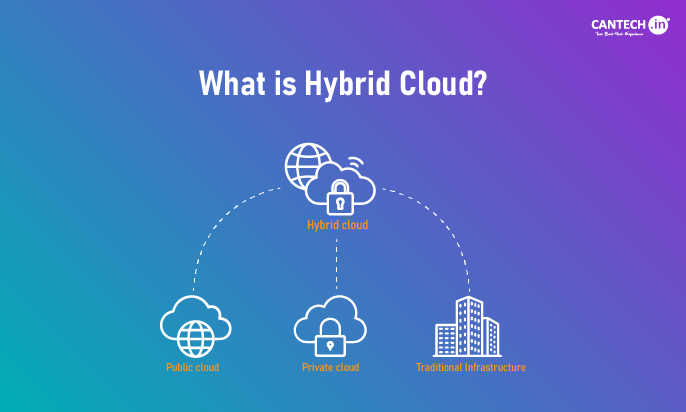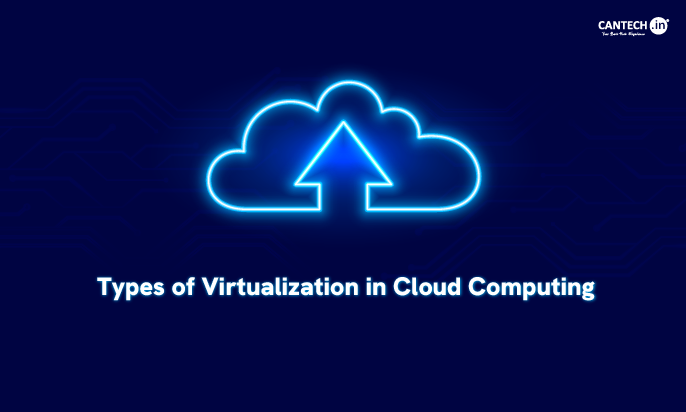The modern digital times offer robust web hosting solutions for businesses and individuals. These modern solutions provide advanced offerings and easy reliability in contrast to inefficient traditional hosting methods that cause frequent downtime. Also, they keep up with your website or application requirements. They are fast and do not cause budget and resource strains. So, if you wish to solve the traditional web hosting issues but cannot choose the right one for your online presence, read this blog on ‘What is Cloud Hosting’.
It is a modern solution that enables the best performance and can help you overcome your challenges with flexibility and scalability. It is a forward-thinking approach to web hosting that prepares you for the future.
This guide will cover the Cloud Hosting meaning, how it works, and why it can be perfect for you. Also, know the types of cloud hosting and different categories. Further, understand the advantages of cloud hosting and also its drawbacks. We will compare it with other popular hosting types to help you make an informed decision.
What is Cloud Hosting?
‘Cloud’ means the virtual here. Cloud hosting server virtualization enables an extra layer of multiple connected virtual servers (also called, virtual machines or VMs) to run independently on top of a physical server.
How Does Cloud Hosting Work?

So, a virtual server draws resources from multiple cloud sources. So, even if any one server suffers it won’t crash your app or website as the other servers would be intact. Due to this reason, it offers great performance and high uptime.
Moreover, this network of numerous virtual cloud servers is distributed across different locations on which you can host your app or site. Whereas traditional hosting services include physical servers that work from fixed premises or are rented from the hosting providers.
Thus, cloud hosting is not dependent on a single server; it uses a network of interconnected cloud servers. Basically, you can get access to the computing resources from a shared pool of cloud server resources. Therefore, it offers a flexible and scalable nature of hosting for your platform by eliminating the challenges of resource provisioning.
It is cost-effective and does not need your own data centers like traditional dedicated servers. You can outsource your resource needs to the service providers. Thus, you can scale as per your growing needs without any operational expenses or investments in hardware.
So, what is Cloud Hosting? It is a modern and efficient web hosting solution through virtualized server environments managed by third-party providers. The future of hosting lies in the cloud.
How can you put cloud hosting into action?
Cloud hosting provider offer all the user-friendly tools, control panels, and dashboards with numerous features. They can easily enable you to manage your website performance, cloud storage, database, etc. Also, these cloud hosting tools manage your domains and can set up FTP accounts to enable remote file transfers. With an ideal cloud hosting provider you need not worry about the complex tasks of set-up, installations, and management, you simply upload the website files with the hosting provider’s servers and it is ready to go.
Why use Cloud Hosting?
The above blog section on Cloud Hosting meaning and working explains how flexible, scalable, and reliable it is. The below points further add to when and why you should consider cloud hosting:
- You can customize your server resources as per your requirements. Cloud hosting can withstand the huge resource requirements of your application like processing power, bandwidth, RAM, and storage space; for example, heavy blogs or news publication sites, search engines, rich media, etc. It offers reliable data backup and disaster recovery solutions.
- Need an ideal web hosting that can manage sudden website traffic rise? Cloud hosting’s distributed infrastructure is right in scenarios like promotions, seasonal traffic, or unexpected flow.
- You can implement advanced security and compliance measures for eCommerce stores, social media networks, or other platform types requiring specialized security.
- Enterprise-level projects with high traffic combine cloud hosting with content management systems (CMS) like WordPress for enhanced, flexible, and easy website development and management.
Advantages of Cloud Hosting
Now, what is cloud hosting in terms of its benefits for your website or application? Let us summarise how virtual cloud servers can give your platform the best performance, convenience, and other advantages.
No Technical Knowledge Required
The cloud hosting service provider takes care of end-to-end server management and maintenance. They handle the backend operations so you need not have any technical know-how of the server operations.
High Uptime
It can easily offer continuous uptime with rare performance issues due to the redundant servers. Your website can stay online even if one server fails because other servers are the backup solution.
Load Balancing
It can draw resources and load the traffic among multiple cloud servers. Thus, it can maintain the performance of the website or application even during excessive or sudden rise in traffic.
Scalable
Server resources such as bandwidth, data storage, or computing power are flexibly allocated only to your website or application without sharing with other websites or applications. Thus, you can scale them as per your requirements. If your demand decreases you can also avoid the cost of maintaining unused resources.
Security
Cloud server security is optimum as multiple virtual machines are backups to hardware failures, website maintenance, or security breaches. The hosting providers offer regular updates in security frameworks.
Cost Effective
Save operations costs and investment on development, setup, and maintenance of the physical server. Also, you only pay for the resources that you use in cloud hosting.
Also Read: Cloud Cost Optimization
Faster Deployment
You need not wait while the traditional hosting servers are purchased, set up, and tested. So, with cloud hosting service providers, you can start getting the benefits of modern technology faster than the slower traditional hosting development process.
Global Accessibility
Cloud hosting has data centers all over the world. Thus, it reduces latency and increases availability to your website or application across various geographic locations.
Disadvantages of Cloud Hosting
Cloud hosting is a popular modern hosting type. However, it does have its share of limitations discussed below –
Internet Connectivity
It depends on an internet connection so if it is lost your website becomes inaccessible. Thus, you must have a contingency plan so that the business operations continue during such downtime.
Complex Customization
Cloud hosting platforms do not provide more advanced or complex customizations & tailored systems. You may choose other hosting types like dedicated servers, unmanaged hosting, Virtual Private Server (VPS), etc that may offer more flexibility.
Security Protocols
You need to evaluate the security protocols of the provider and implement additional measures if needed for the data stored remotely in offsite storage.
Different Types of Cloud Hosting
The distinct features and levels of management differentiate the five types of cloud hosting. Choose the best suitable type as per your website or application needs from the below:
| Types of Cloud Hosting | Description |
| Public Cloud Hosting |
|
| Private Cloud Hosting |
|
| Hybrid Cloud Hosting |
|
| Managed Cloud Hosting |
|
| Shared Cloud Hosting |
|
Different Categories of Cloud Hosting
The types of Cloud Hosting include four main categories discussed below. They are divided as per the control and flexibility that they provide.
Infrastructure as a Service – IaaS
With IaaS, you get the virtualized hardware resources for your software environment installation. Thus, you need not build and maintain physical data centers and simply rent the server and computing resources. Also, you only pay for your usage. This category of cloud hosting offers high scalability too.
Platform as a Service – PaaS
This category enables speedy development and deployment of web applications with the software environment that it provides. It is a full application deployment platform that requires manual scaling. The management of the cloud server resources is in the hands of the PaaS providers. Thus, you need not worry about infrastructure management and create software with convenience. You can keep your focus only on your project.
Software as a Service – SaaS
When you get the ready software applications over the internet it is called SaaS. The vendor offers them on a subscription basis. The applications can be accessed on any device as they are hosted on a cloud. You need not have an in-house server and get enterprise-grade software without huge upfront investments and operation costs.
Serverless Computing
You can execute functions or microservices in response to events using serverless computing without the need to manage the infrastructure. The server management tasks are handled by the providers. Thus, it speeds up the application-building process and brings down the operational challenges. It scales automatically as per the variable workloads.
Cloud Hosting VS Other Types of Hosting
What is cloud hosting compared to other hosting types i.e. Cloud hosting vs. Web Hosting, VPS, Shared, and Dedicated Hosting?
Cloud Hosting vs. Web Hosting
Web hosting includes various hosting types including cloud hosting. Check out the difference between cloud hosting and web hosting to get further clarity –
| Feature | Cloud Hosting | Web Hosting |
| Meaning | Cloud Hosting setup involves a cluster of multiple servers interconnected to each other for sharing resources. | Web hosting is a comprehensive term for various types of hosting solutions such as shared, VPS, cloud, and dedicated hosting services. You can choose one depending on your specific needs. |
| Performance | Cloud hosting distributes resources across multiple servers. Thus, it can offer better performance during high traffic. | Depends on the type of server you choose based on your needs. However, web hosting relies on a single server so performance depends on its capacity. |
| Security | Cloud hosting stores data across multiple servers, therefore, it can improve security with redundancy and faster recovery. | A single server is responsible for security so it can have risks of data loss during attacks or hardware failures. However, it depends on the type you choose, for example, a dedicated server offers advanced security and compliance. |
| Scalability | Cloud hosting allows real-time scaling of resources without interruptions. It quickly adapts to traffic spikes. | Scaling resources are limited to physical upgrades and it may get downtime. |
| Cost Efficiency | Cloud hosting follows a pay-as-you-go model. You pay only for the resources consumed. | Web hosting has fixed pricing for resources regardless of usage. |
Cloud Hosting vs. VPS Hosting
VPS Hosting is similar to cloud hosting. It partitions a physical server into multiple virtual servers using virtualization. The differences between cloud hosting vs VPS hosting are discussed below:
| Feature | Cloud Hosting | VPS Hosting |
| Cost and Performance | It is scalable and flexible and so can be more expensive. However, it is a good option for high-traffic websites as it offers high performance. | It is less expensive. It offers dedicated resources, so it offers stable performance. |
| Resource Allocation | It uses multiple cloud servers on a physical server distributed across various locations. | It has a single physical server that is partitioned into multiple virtual servers. |
| Management and Customization | It does not require technical skills because the cloud hosting provider manages it. However, it is less customizable and provides limited control. | It requires technical know-how as it is often self-managed with root access. Thus, it offers more control over server configuration and software installation. |
| Security | It has multiple virtual machines and offers isolation so it is highly secure. | It is secure as it offers dedicated resources and a dedicated IP address. |
Cloud Hosting vs. Shared Hosting
Shared hosting means when one server allocates its resources between multiple websites. The differences between cloud hosting vs shared hosting are discussed below:
| Feature | Cloud Hosting | Shared Hosting |
| Cost | It offers advanced features and scalability so it is high in cost. | It offers lower cost so it is ideal for small businesses and personal websites. |
| Performance and Scalability | It has features like traffic load balancing to ensure high performance. It does not share the resources with other apps or sites. Also, it is easily scalable. | The performance can be affected due to other websites on the same server as the resources are shared. It offers limited resources and scalability. |
| Security | More secure with dedicated virtual isolated environments. | It can cause a security threat even if one website on the server suffers a breach. |
| Maintenance and Ease of Use | The hosting provider manages and maintains the server. Thus, it is suitable for users of all skill levels. | This hosting type is also managed and maintained by the hosting provider. It is ideal for small-scale and beginners. |
Cloud Hosting vs. Dedicated Server
The dedicated server hosting type allocates all its resources to a single site or app with complete access, control, and customization of server configuration, settings, installation, etc. The differences between cloud hosting and dedicated server hosting are discussed below:
| Feature | Cloud Hosting | Dedicated Server |
| Cost | It is cost-efficient, you can pay as per your usage of server resources. | It is high in cost as it offers dedicated resources. |
| Performance and Scalability | It ensures high performance with a load-balancing feature. Also, it offers easy scalability. | It gives the best website or app performance because all server resources are dedicated to one website. It is scalable as per the hosting provider’s offerings. |
| Management and Control | The hosting provider manages and maintains cloud hosting. Thus, it reduces the need for technical skills. However, it offers lesser control. | Requires advanced skills to manage and maintain the server, but offers full control. |
| Security | It offers high security. | The complete control and customised configurations of the server ensures the best security with proper server management. |
| Resource Allocation | It draws resources from a shared pool of multiple servers. | All server resources are dedicated to a single website or app. |
Choose the right Cloud Hosting Plan
To ensure effective management of resources and that the site performs well, you need the right cloud hosting plan. So, you should carefully evaluate several factors based on your unique needs —
- Evaluate your website’s needs in terms of estimated traffic and the storage, processing power & bandwidth you will require for the same.
- Compare hosting packages for features and pricing structures. Understand what each of them offers in terms of services, performance, reliability, and uptime guarantees.
- Prioritise security features when choosing a hosting plan. Take into account the data protection measures and policies. necessary compliance standards, and privacy regulations.
Consider additional features like ensuring that backup and recovery solutions are part of the package. Also, confirm that the hosting provider integrates well with other tools or services you may use.
Cantech Offers Superior Cloud Hosting Services
What is Cloud Hosting like with Cantech? We offer robust cloud infrastructure and ensure the best performance optimization with our services. Our plans start at just ₹640 per month with premium features that guarantee high uptime and super-fast load times. They include unlimited email accounts, databases, bandwidth, free SSL certificates, and more.
Our cloud hosting server management becomes easy with an intuitive cPanel interface that comes with our services. You can easily oversee your website, manage emails, and scale resources using the same. Also, we provide 24/7 technical support. Any business type from a startup to an enterprise can rely on and scale with Cantech’s Cloud Hosting and Enterprise managed hosting.
Conclusion
This comprehensive blog on ‘what is cloud hosting’ covers various important aspects because choosing the appropriate hosting type with an ideal provider is essential. These decisions can ensure the efficiency and reliability of your website or application.
Cloud hosting is a modern solution with a lot of benefits such as optimal performance and scalability. It has better features compared to traditional hosting options. With Cantech, you can ensure consistent performance and uptime due to our advanced features and around-the-clock support. Get in touch today!
FAQs On Cloud Hosting
What Are Cloud Hosting Services?
Cloud hosting services include virtual servers in the cloud to facilitate hosting for your website or app. It provides access to resources from multiple interconnected servers. Thus, you get great flexibility and high availability.
What is Cloud Hosting used for?
Cloud hosting provides server resources and infrastructure to host websites, applications, and data storage. It is highly suitable if they need scalability, better performance, and reliable uptime.
Is Cloud Hosting the best?
The main benefits of cloud hosting include scalability, flexibility, and high uptime. It is the best for these reasons but the best hosting depends on the specific requirements of a website or application.
What is Cloud vs Non-Cloud hosting?
Cloud hosting uses multiple virtual servers to host websites. It gives better scalability and reliability, Whereas, non-cloud hosting uses a single physical server with more control and fixed server resources.
What Are the Best Cloud Hosting Providers?
You can choose from several top cloud hosting providers that offer unique features and pricing. Some popular choices include –
- Cantech
- Hostinger
- MilesWeb
- HostGator
- A2 Hosting
How Do I Choose a Cloud Hosting Provider?
You need to consider several factors and compare different cloud hosting providers for their offerings, pricing, performance, customer reviews, scalability, security, technical support, etc. Discuss with them and ensure they are reliable for your website needs.
Who should use Cloud Hosting Solutions?
If a site or app experiences fluctuating traffic, needs high performance & uptime, or requires the ability to scale resources quickly, they may prefer cloud hosting solutions.
What is Cloud Hosting Account Set-up Process?
Compare and choose the best cloud hosting provider and plan for your website or app. Get started with them and create an account. You will need to make server configurations and upload the website files. Point your domain and carry out thorough testing.
How to Migrate to Cloud Hosting?
Compare and choose the best cloud hosting provider and migrate your data to their servers. The hosting provider would offer support for the migration. As per your current setup, you need to make server settings and configurations. Perform rigorous testing to ensure the compatibility and website functionalities.
When should you Migrate to Cloud Hosting?
You should migrate to cloud hosting for better uptime, handling increased traffic, or if you are upgrading from your current hosting to meet your business demands. Its setup reduces the risks of server downtime to a great extent.
What are the different types of Cloud Hosting Services?
The different types of cloud hosting services include public cloud, private cloud, hybrid cloud, and multi-cloud hosting. They differ in terms of resource control, security, and scalability.
Is Cloud Hosting cheaper than Shared Hosting?
Cloud hosting plans have higher prices than shared hosting as they provide modern infrastructure, scalable resources, and various advanced features for higher performance.
What Is the Difference Between Cloud Hosting and Saas?
Cloud-hosted services provide the infrastructure to host websites and applications. Whereas, Software as a Service (SaaS) is a cloud-based software delivery model with which you can access software over the internet without management responsibilities of infrastructure.
What Is the Difference Between Cloud Hosting and Computing?
Cloud hosting uses virtual servers to provide hosting services. Whereas, cloud computing is related to providing various IT resources like storage, processing power, and networking through the internet. It not only involves hosting, it is more than that for other functions like data analysis and machine learning
What Is the Difference Between Web Hosting and Cloud Hosting?
When an interconnected network of virtual servers on a physical server is used to host websites then this setup is called cloud hosting. Cloud hosting uses multiple virtual servers on a physical server. These servers are across various locations distributing resources. Whereas Web hosting uses one server for your website’s files. Thus, cloud hosting is more scalable, flexible, and reliable. It offers high performance, security, and faster loading times.
Why is Cloud Hosting better than On-Premise?
Cloud hosting is better than on-premise hosting in terms of greater scalability, uptime, and reduced maintenance. Businesses need not incur high upfront costs of buying and maintaining physical servers.







